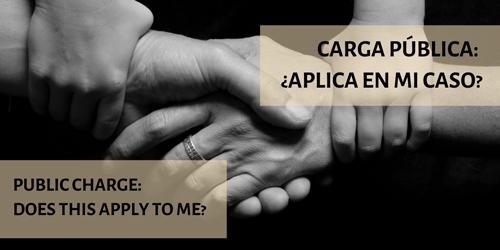Public Charge Rule

Make the right choice for you and your family
Public charge does not apply to all immigrants. Every family is different, and the programs that help your family might not be part of new changes to the policy. There are lots of people and organizations that can help you. An immigration attorney familiar with this issue can give you advice based on your specific situation. Local non-profits may also be able to provide help and legal advice.
What is public charge?
Some people who apply for a green card (lawful permanent residence) or a visa to enter the U.S. must pass a “public charge” test – which looks at whether the person is likely to use certain government services in the future. In making this determination, immigration officials review all of a person’s circumstances, including their age, income, health, education or skills (including English language skills), and their sponsor’s affidavit of support or contract. They can also consider whether a person has used certain public programs.
DHS’ new public charge test considers:
- Supplemental Nutrition Assistance Program (SNAP, “EBT” or “Food Stamps”)
- Federal Public Housing and Section 8 assistance
- Medicaid (except for emergency services, children under 21 years, pregnant women, and new mothers)
- Cash assistance programs (like SSI, TANF, General Assistance)
Most people who are subject to the new rule are not eligible for the above listed benefits. Services that are not listed above will not be counted in the public charge test. This includes WIC, CHIP, school lunches, food banks, shelters, state or local health care programs, and many more.
Are you and your family members U.S. citizens?
Public charge does NOT apply to you.
You should continue to enroll in programs you are eligible for.
Do you and your family members already have green cards?
Public charge and any changes under new rules rule WILL NOT affect you when you renew your green card or apply to become a U.S. Citizen. However, if you plan to leave the country for more than 6 months, it is a good idea to talk with an immigration attorney.
Are you applying for or have one of the following statuses?
TPS, U or T Visa, Asylum or Refugee status, or Special Immigrant Juvenile Status? The public charge test does NOT apply to all immigrants, including the categories listed here. If you already have or are in the process of applying for one of these immigration statuses, you can continue to use any government programs that you qualify for.
Do you plan to apply for a family-based green card?
Only the use of the public programs listed on first page will be considered in the public charge test. Your income, age, health, education, skills, family situation, and sponsor’s affidavit of support will also be considered. You should talk with an expert for advice on your case before making any decisions. For free or low-cost options in your area, go to https://www.immigrationadvocates.org/nonprofit/legaldirectory/
You can also refer to California Department of Social Services for a list of qualified immigration services and legal resources: https://www.cdss.ca.gov/Benefits-Services/More-Services/Immigration-Services/Immigration-Services-Contractors
Local Resources: Secure Families Fund
The County of Sonoma has long been committed to supporting our residents in the face of the Federal Administration’s attacks on our immigrant communities. The Sonoma County Board of Supervisors established the Sonoma County Secure Families Collaborative to meet the needs of our County’s immigrant community’s increased challenges due to the changes in federal immigration policy and the North Bay wildfires. The Collaborative’s purpose is to increase legal capacity for immigrants in Sonoma County and to keep immigrant families together, safe, and thriving in our community.
Residents can contact Sonoma County Secure Families for legal assistance to help immigrants understand their status under the change in the Rule at (707) 819-2272 or find more information on www.sonomacountysecurefamilies.org